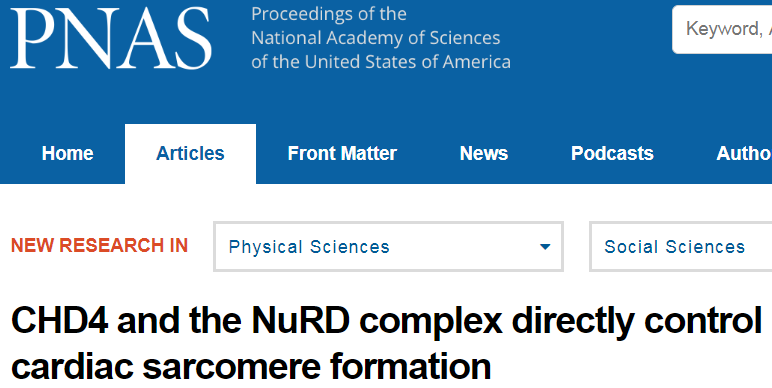On Jun 11th, PNAS report the research in the article of
CHD4 and the NuRD complex directly control cardiac sarcomere formation, Dr. Frank Conlon from McAllister Heart Institute, University of North Carolina is the main author of this paper.
The function of CHD4
CHD4 is a protein encoded by the CHD4 gene and is often used as part of a multi-protein "machine" that helps regulate gene activity in the nucleus. Therefore, the researchers conducted a series of experiments to measure and analyze changes in gene activity in cardiomyocytes when CHD4 was deleted. They found that CHD4 protein was usually directly bound to DNA, inhibiting the activity of genes encoding non cardiac proteins. These proteins contribute to the formation of elastic fibers (myofibrils, myofibrils), which contract and relax when muscles work. However, when the CHD4 protein was deleted, the researchers found that these other non-cardiac proteins were inappropriately produced in developing cardiomyocytes. They bind to the myofibrils of these cells and form abnormal "hybridized" myofibrils, leading to a lack of normal cardiac function.
Experimental verification
To test this conclusion, Conlon Laboratory graduate student and first author Caralynn M. Wilczewski and his team first studied engineered mice lacking the CHD4 gene in developing and embryonic heart cells. These mice developed severe heart defects in the second trimester, and none of them survived. The results further confirmed the necessity of
CHD4 in cardiac development.
In addition, Wilczewski has developed an advanced ultrasound technology that can be used to record minute heart activity in mouse organs. "We observed that a heart deficient in CHD4 and abnormal myofibrils severely reduced ventricular contraction, suggesting a loss of normal pumping capacity." He said.
"These findings suggest that normal heart development in mice depends on inhibition of non-cardiac fibrin in cardiomyocytes, which enables the formation of normal cardiac fibers to maintain normal cardiac contraction," Dr. Conlon said.
In summary, the researchers found that CHD4 proteins play a role in the development of cardiomyocytes, inhibiting the production of myofibrillar proteins originally used in non-cardiac muscle cells; failure to inhibit
CHD4 proteins leads to abnormal "hybrid" muscle cells that are not as thin as normal hearts. Cells can pump blood effectively.
Significance
This finding provides the first clear understanding of the mechanism of CHD4 related heart defects. The researchers suggest that restoring normal inhibition of non-cardiac myofibrillar proteins may prevent heart defects in the presence of a CHD4 mutation.
"For patients with congenital heart disease associated with a mutation in CHD4, this study helps to explain why their hearts do not work properly and suggests therapeutic interventions." Dr. Conlon said.
In addition, they plan to use the new ultrasound technology developed by Wilczewski to further explore the application of this technology in congenital heart disease model testing.
Abebio developed ELISA kit
CHD4, with high sensitivity and stability, please contact us if you have any inquiry.
Cindy
